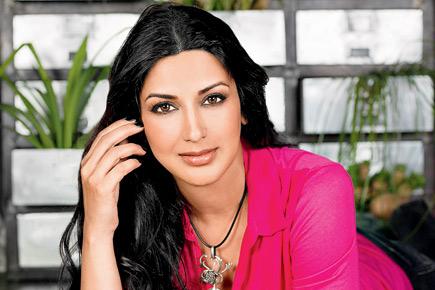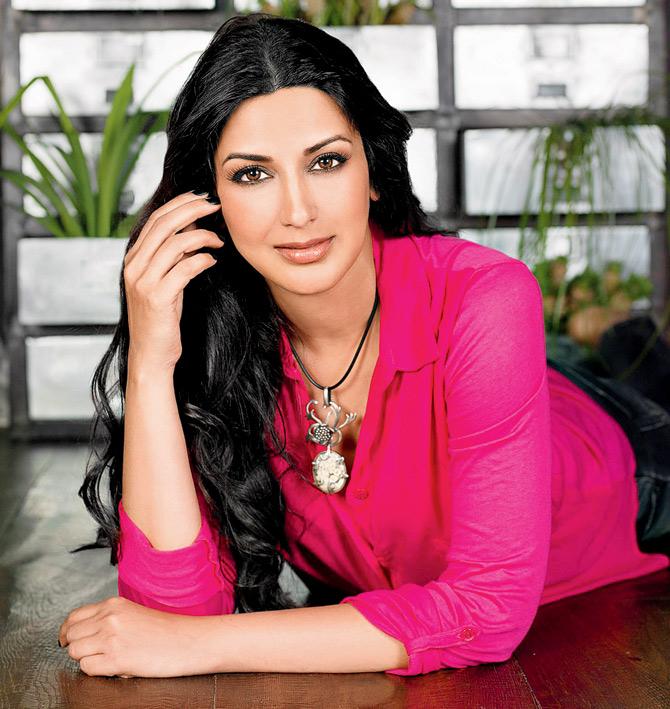Bollywood actress Sonali Bendre Behl plays the toughest role of her life in the real world -- that of first-time mum. The lessons it’s taught her make it to a new book

Sonali Bendre
It was about 10 years ago that actor Sonali Bendre Behl stepped aside the silver screen to nurse her career as fulltime mum. The real life drama that comes with that part — a role of and for a lifetime — now unfolds on the pages of The Modern Gurukul, a slim 204-page Penguin Random House India publication.

Sonali Bendre
It’s a simple book that starts off like a mother’s diary right from zero hour, actually just from a little bit before the labour pains strike, from the point where Bendre-Behl is sitting pretty, confident that she’d ace motherhood, confident even that she wouldn’t need epidural. But, her first submission comes within 12-hours of labour — “Knock me out. Give me that epidural. I’m desperate” — and in a way it sets the tone for what’s to come. This is a book on parenthood, its joys and frustrations and coming to terms with the fact that sometimes you’re plain wrong and, what’s more, nobody really knows what’s “right”.
This is a point that comes through in the first few pages itself, when Bendre-Behl talks about breastfeeding. While baby books typically prescribe a regimental chart of how and when to wean babies off breast milk, the actor found that approach just didn’t work for her and introduced solid foods at three months, that’s three months ahead of the prescribed time. “It’s an example that I felt was very important because for everything that new mothers are told and taught, every child is different and sometimes you need to try different things. There’s no hard and fast rule,” she tells us, emphasising that her book is about her journey, that it’s not some sort of cheat sheet that’ll guarantee an A+ in motherhood. “When my husband read the draft, one of the things that he was concerned about was the kind of pressure it would put on our son to be a good boy,” she laughs, referring to director Goldie Behl.
The clarity is necessary, because while the book touches on some very important issues, such as the pressure to fall in love with your baby at first glance, the harsh self-criticism that follows when you don’t, and the need to expose your vulnerabilities to your children, admit mistakes and apologise when you’re wrong, parts of it may set the bar too high for many.
Though differently phrased in different chapters, on more than one occasion, Bendre-Behl stresses, “I did EVERYTHING myself,” — she refers of course, to the feeding, bathing, massaging etc. Surprisingly, even though she speaks of the need for a strong support system for mothers, that topic is quickly diminished into a “need to maintain peace” as the author goes on to set clear limits for what grandparents must do, pretty much limiting their role to showering the kids with love and affection. To be fair, she does also repeatedly point out that, “Not all are as fortunate as me.”
Her decisions to enroll her son in an IB school, follow certain diet regimes or allow mealtimes before the tele etc. are therefore exactly that — her decisions. This is important to remember because to a new mother struggling to cope with a flood of hormones, a large workload and household chores, a line such as, “If you really want something, you will make time for it,” can be all it takes to push you across to full-blown postpartum depression. Though more than two pages have been dedicated to Tamil poet Thiruvalluvar’s excellent tips from Thirukkural, a book on ancient behavioural psychology as it were, this book must therefore not be treated as a guide book on parenthood but rather a means to exchange notes with a mother.
In that ambition — as a book that touches on issues that most mothers in India would have dealt with — it succeeds. Though certain lines and scenes here are easily imagined as film dialogues, like, “I decided that I would be that teacher for Ranveer and our home would be his gurukul” the author’s commitment to stay true to her cause — to familiarise Indian women with the evolution of Indian parenting — is evident in her honest approach.
She has opened up about family disagreements on viewpoints and even her husband’s dyslexia, though clearly these are sensitive topics. She tells us, “This whole experience has been very scary for me. I’m not even on social networking sites because I’m such a private person, so for me to write all this... but I realised I needed todo it properly, and to be completely
honest because sometimes, you hear about someone dealing with something and it can help you with what you’re going through.”
 Subscribe today by clicking the link and stay updated with the latest news!" Click here!
Subscribe today by clicking the link and stay updated with the latest news!" Click here!










